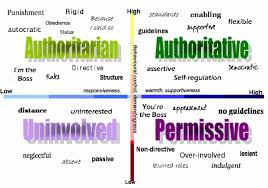One of the main problems within step families is who disciplines whose children.

The simple thing is to sit down with a cup of coffee and a pen and paper and fold your paper in half. On one side write ‘What is acceptable behaviour’ and on the other side write ‘What isn’t acceptable behaviour’ Then have a chat with your partner about what you both feel is your style of discipline, rules, boundaries and who does what. Do you feel comfortable if your partner chastises or corrects your son, is it ok to chastise your partner’s daughter? What are the consequences if your kids break the rules? Who implements the consequences? Who is the ‘good cop/bad cop’ or are you both in it together? Clarity, communication and respect are the key energies of any happy family.
There are four important aspects of parenting:
•Disciplinary strategies
•Warmth and nurturance
•Communication styles
•Expectations of maturity and control
Our parenting style can be one that we naturally are inclined to, or it can be influenced by the way we were brought up as children, or in many cases, with the parents I work with, it can be a reaction against the way you were brought up. But I think it’s helpful to at least be aware of your parenting style particularly as it needs to change during the teenage years or when you are nurturing and creating a step family, when you need to become more flexible.
One thing I believe kids of all ages need is firm, fair, consistent discipline.
The Four Parenting Styles

Authoritarian Parenting
In this style of parenting, children are expected to follow the strict rules established by you and failure to follow your rules usually results in a punishment or consequence of some sort. Often, I find that authoritarian parents fail to explain the reasoning behind these rules and if they are asked to explain, they often simply reply, “Because I said so.” These parents have high demands, but are not responsive to their children and are not very flexible in their parenting approach and they expect their orders to be obeyed without explanation which can cause friction and frustration in their step children so arguments often erupt, particularly in the toddler and teenage years when children are striving for independence.
Authoritative Parenting
Like authoritarian parents, authoritative parents have rules and guidelines that their children are expected to follow but they are far more flexible and democratic. Authoritative parents are in charge but they are more responsive to their step children and willing to listen to their questions and explain why they have the rules that they have. “If you eat sweets before your tea you won’t feel hungry and you need to eat a healthy meal first. Sweets are a treat.” When children fail to meet the expectations, these parents are more nurturing and forgiving rather than punishing. They are assertive, but aren’t too harsh, judgmental, critical or too restrictive. Their disciplinary methods are supportive, rather than punitive. Parents with this style want their children to learn to be assertive as well as socially responsible, and they enjoy “talking and teaching” their children so they grow up learning to self-regulate as well as be cooperative.
Permissive Parenting
Permissive parents are sometimes referred to as indulgent parents, who make very few demands on their children. These parents rarely discipline their kids because they have relatively low expectations of maturity and self-control and don’t expect their children to be able to do as they are told. They are non-traditional and lenient, and they don’t expect their kids to show mature behaviour, or be able to self-regulate, and these parents avoid confrontation. Permissive parents are generally nurturing and communicative with their children, but they try to be their child’s friend rather than their parent and when I work with them they are often exhausted! Be aware of this potential inclination when you become a step parent to please your partner’s children!
Uninvolved Parenting
An uninvolved parenting style is characterised by few demands, low responsiveness and little communication. While these parents fulfil their child’s basic needs, they are generally detached from their child’s life. In extreme cases, these parents may even reject or neglect the needs of their children.
The Impact of Parenting Styles
So, what effect do these parenting styles have on your step family?
- Authoritarian parenting styles generally lead to children who are obedient and proficient, but they rank lower in happiness, social competence and self-esteem.
- Authoritative parenting styles tend to result in children who are happy, capable and successful.
- Permissive parenting often results in children who rank low in happiness and self-regulation. These children are more likely to experience problems with authority and tend to perform poorly in school.
- Uninvolved parenting styles rank lowest across all studies. These children tend to lack self-control, have low self-esteem and are less competent than their peers.
Why Do Parenting Styles Differ?
You may wonder why all parents don’t simply use the authoritative parenting style. After all, this parenting style is the most likely to produce happy, confident, capable, well balanced, positive, independent children but there are lots of reasons why parenting styles vary but some of them include differences in culture, personality, family size, parental background, socioeconomic status, educational level, and religion.
Of course, the parenting styles of each individual parent combines to create a unique blend in each and every family. For example, your partner may display an authoritative style while you favour a more permissive approach and of course step kids love to play one parent off against the other, don’t they?
So, the secret is to sing from the same song sheet in order to create a cohesive approach to your family style of parenting and it’s important that you learn to cooperate as you combine your particular parenting styles, but don’t forget that your child’s personality and temperament can also play a major role in how this all works at home!









